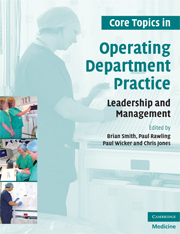Book contents
- Frontmatter
- Contents
- List of contributors
- Foreword
- Preface
- 1 Managing change in perioperative education
- 2 The role of the operating department manager within the context of the organization
- 3 Action learning: a new way of problem solving in perioperative settings
- 4 Agenda for change: what do theatre staff need to know?
- 5 The SWOT analysis: its place in strategic planning in a modern operating department
- 6 Corporate governance: setting the scene for perioperative practice
- 7 Managing different cultures: adversity and diversity in the perioperative environment
- 8 Leadership in perioperative settings: a practical guide
- 9 Management and leadership of advanced practice
- 10 Managing conflict in perioperative settings
- 11 The management and organization of emergency operating lists
- 12 Organizational culture
- 13 Development matters in the NHS; including a perioperative approach to the KSF
- 14 Equipment procurement: a purchaser's guide for theatre managers
- 15 The reflective practitioner in perioperative settings
- 16 New ways of working in perioperative practice
- 17 Damned if you do and damned if you don't: whistle blowing in perioperative practice
- 18 A manager's experience of recruitment and retention
- 19 The management of change
- Index
- References
4 - Agenda for change: what do theatre staff need to know?
- Frontmatter
- Contents
- List of contributors
- Foreword
- Preface
- 1 Managing change in perioperative education
- 2 The role of the operating department manager within the context of the organization
- 3 Action learning: a new way of problem solving in perioperative settings
- 4 Agenda for change: what do theatre staff need to know?
- 5 The SWOT analysis: its place in strategic planning in a modern operating department
- 6 Corporate governance: setting the scene for perioperative practice
- 7 Managing different cultures: adversity and diversity in the perioperative environment
- 8 Leadership in perioperative settings: a practical guide
- 9 Management and leadership of advanced practice
- 10 Managing conflict in perioperative settings
- 11 The management and organization of emergency operating lists
- 12 Organizational culture
- 13 Development matters in the NHS; including a perioperative approach to the KSF
- 14 Equipment procurement: a purchaser's guide for theatre managers
- 15 The reflective practitioner in perioperative settings
- 16 New ways of working in perioperative practice
- 17 Damned if you do and damned if you don't: whistle blowing in perioperative practice
- 18 A manager's experience of recruitment and retention
- 19 The management of change
- Index
- References
Summary
Key Learning Points
Understand the genesis of the recent remuneration strategies in the NHS
Appreciate the underpinnings of the Agenda for Change approach to pay settlement
Identify the elements of a grade determination under Agenda for Change
Identify special considerations that apply to perioperative staff in setting pay grades
Leadership within the operating theatre is essential to create an environment for staff development and the delivery of effective patient care. Managers have the responsibility to contribute to healthcare planning and the promotion of policy development. The rationale for recent modernization of the health service, to ensure that care provision is of high quality and is supported by the appropriate planning framework, has been set out in strategic health and social policy documents (Department of Health 2000, 2004a).
It is important for managers and other clinical leaders to have a repertoire of skills and interventions that can be used to motivate and engage clinical teams in risk assessment and continuous quality improvement at the level of patient care delivery (Ferguson et al. 2007).
Agenda for Change
The Agenda for Change (AfC) was introduced as an initiative to modernize pay and grading within the NHS (Department of Health 2004b). This significant change for managers would initiate a new pay structure and terms and conditions for all health-related staff including perioperative practitioners.
- Type
- Chapter
- Information
- Core Topics in Operating Department PracticeLeadership and Management, pp. 28 - 33Publisher: Cambridge University PressPrint publication year: 2009

